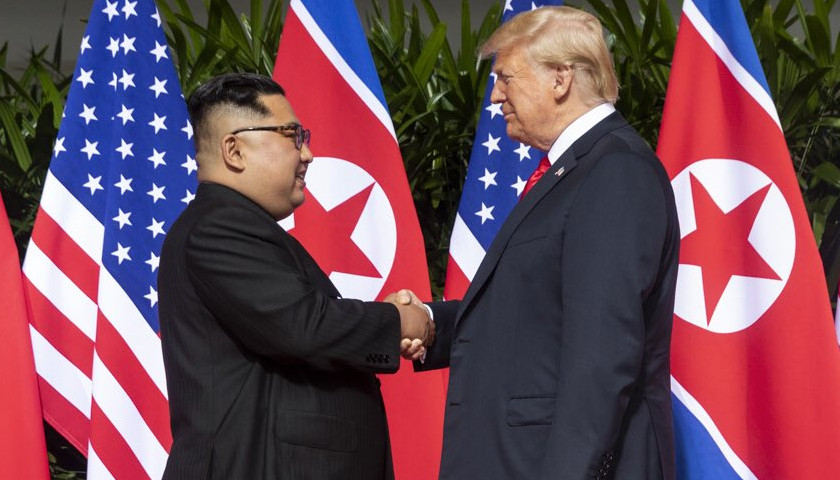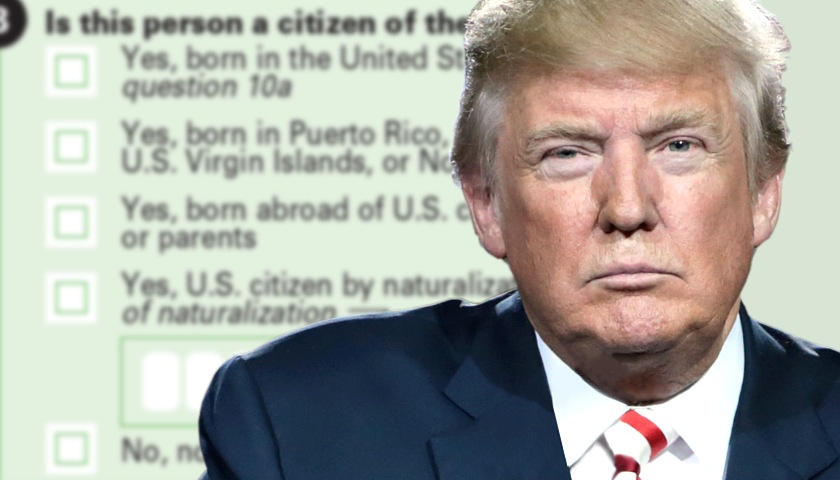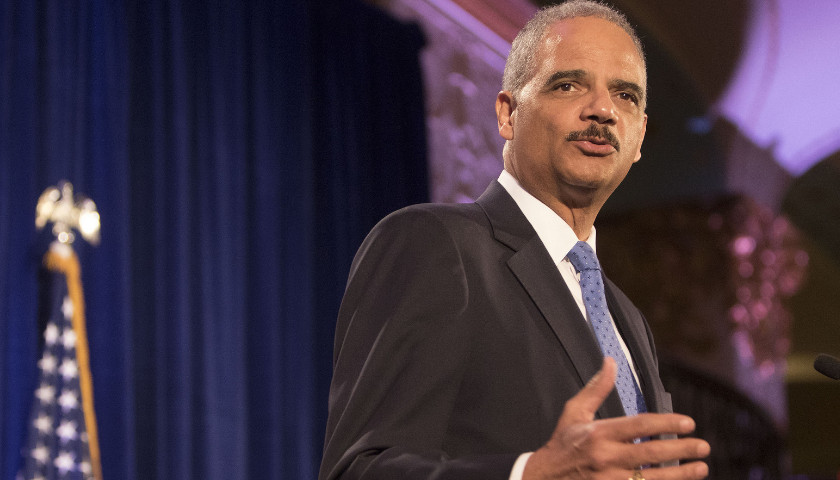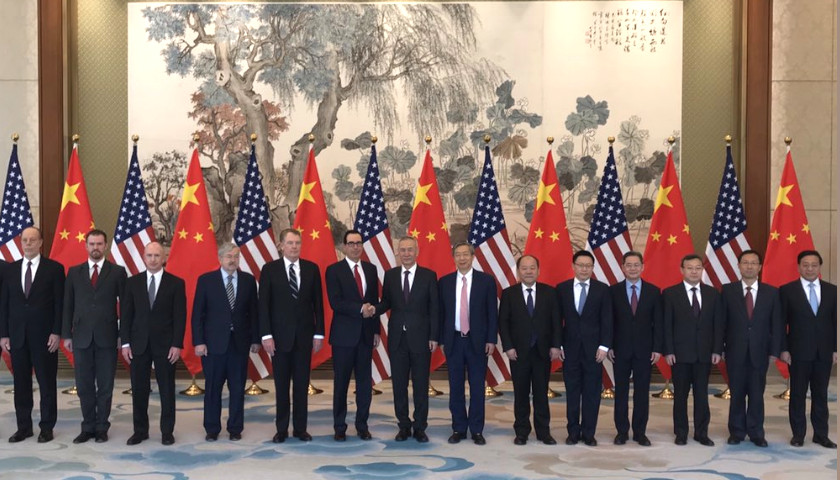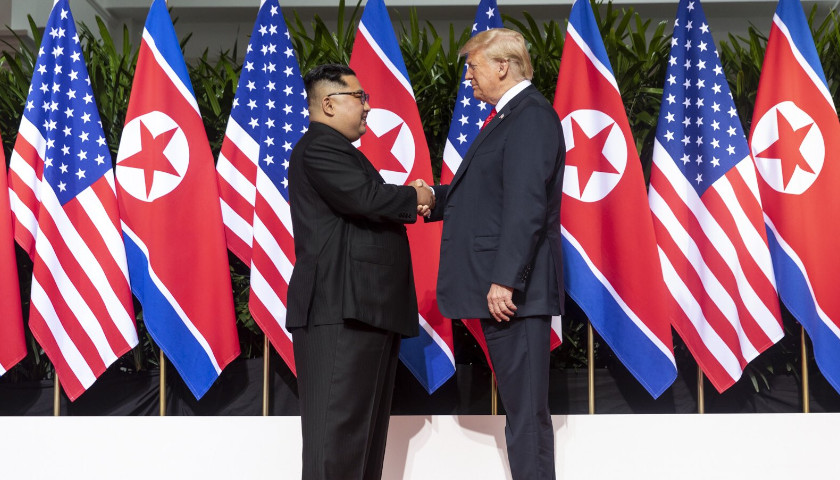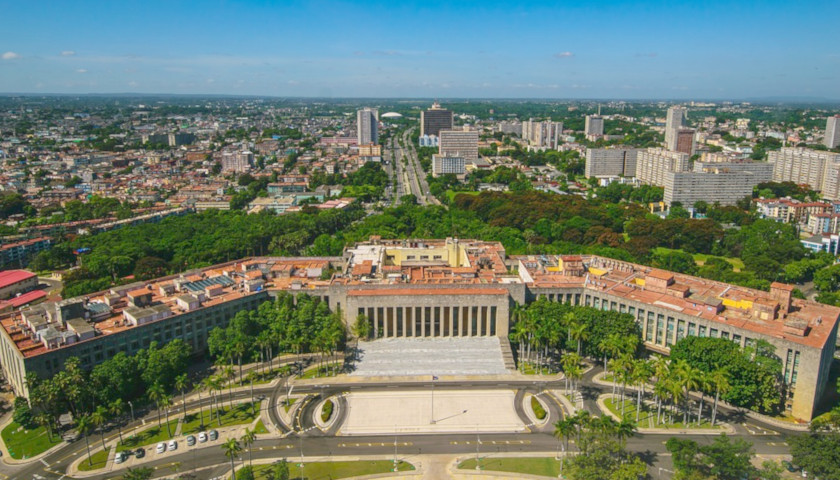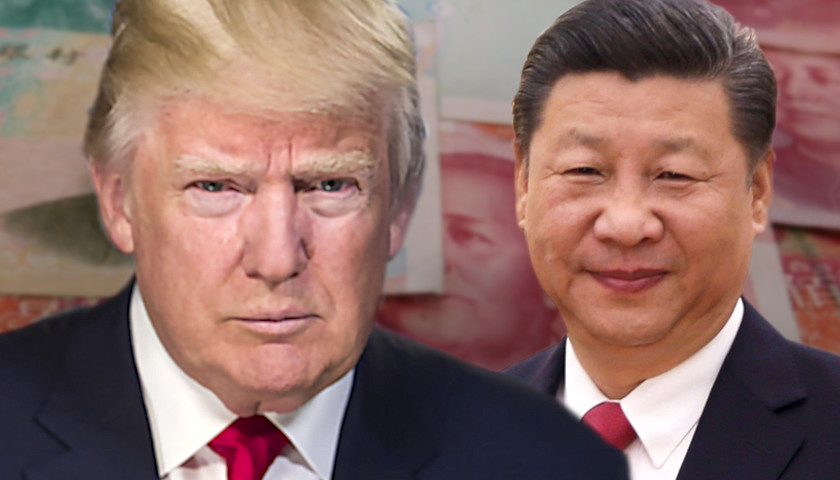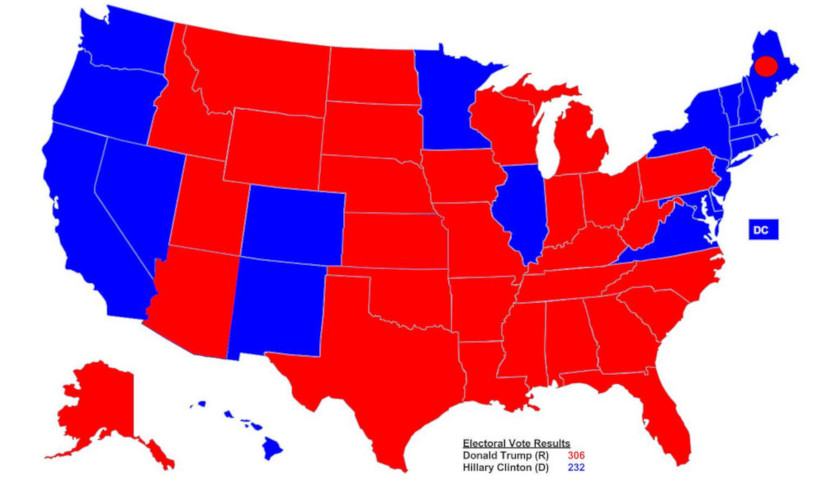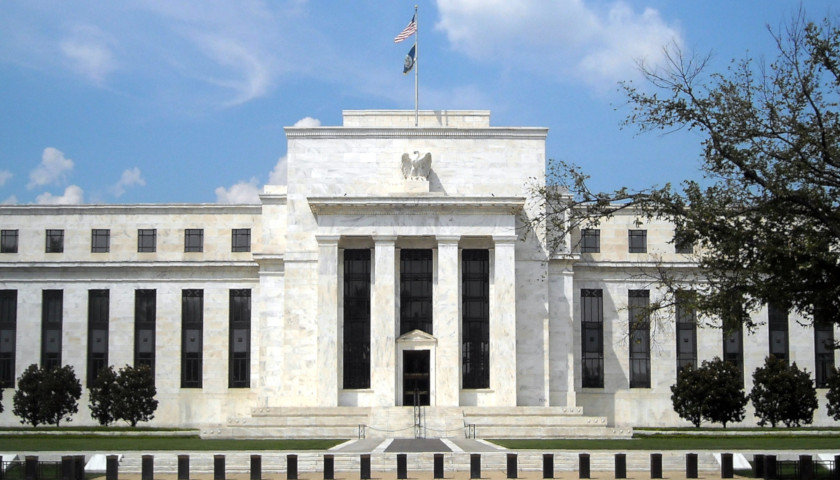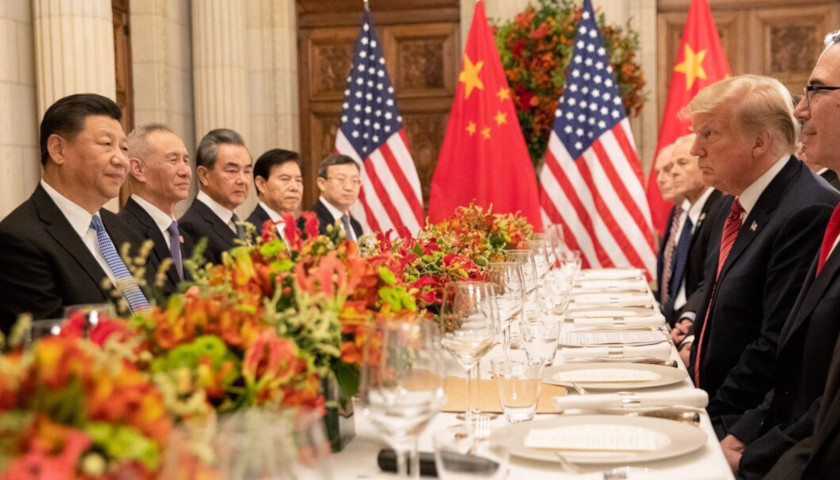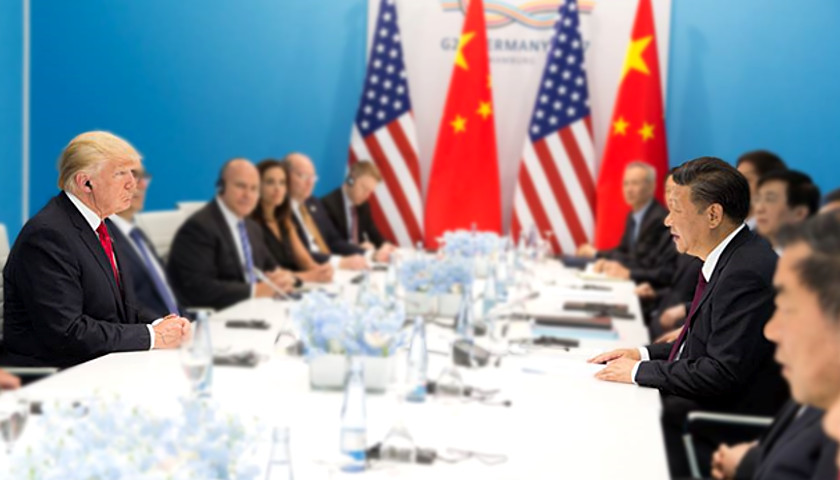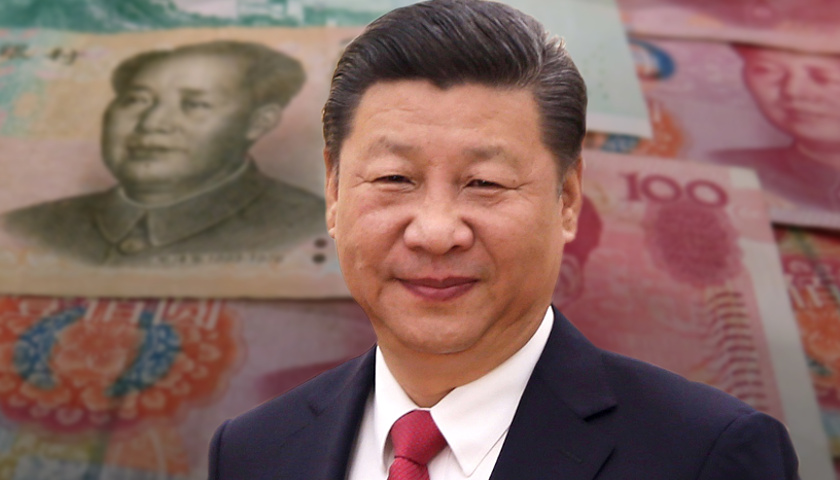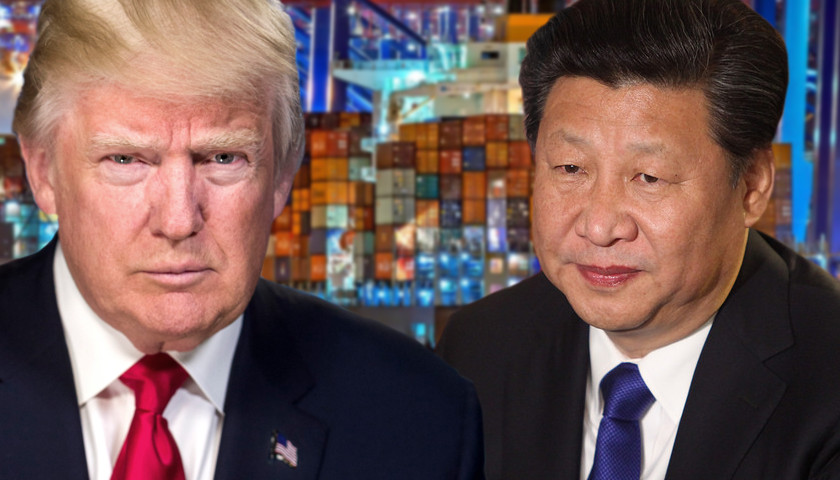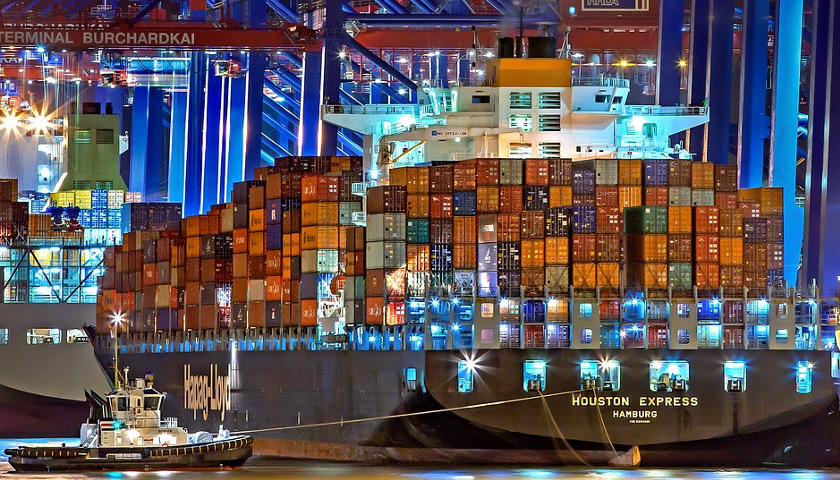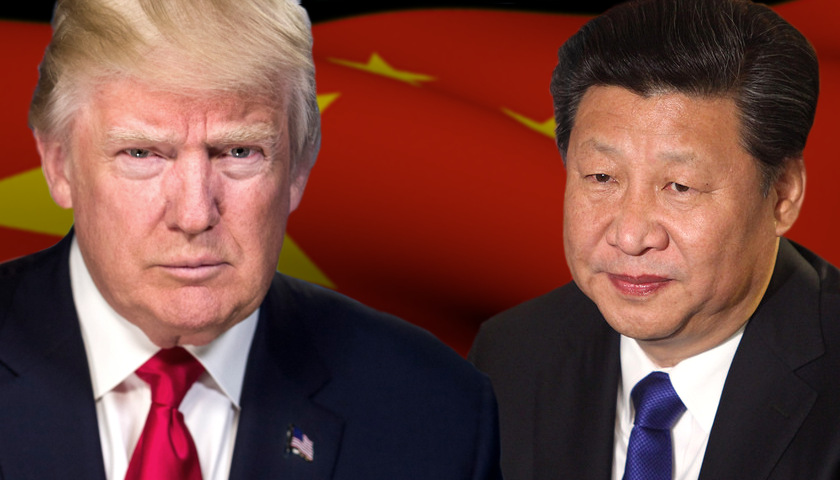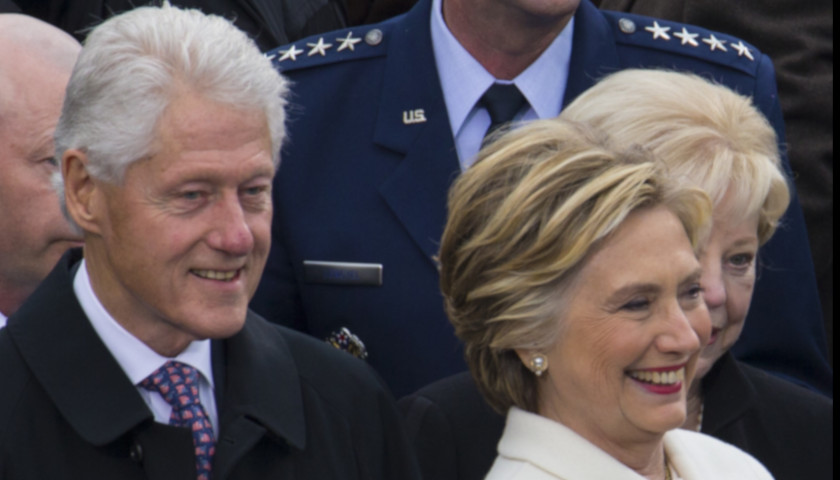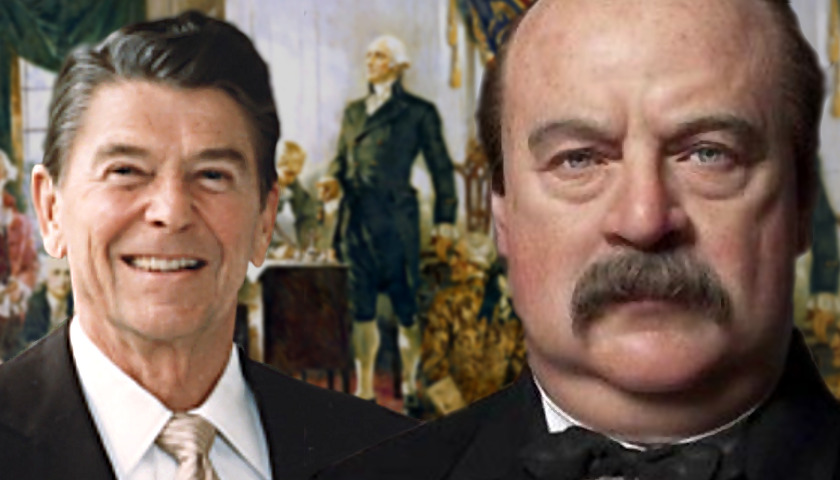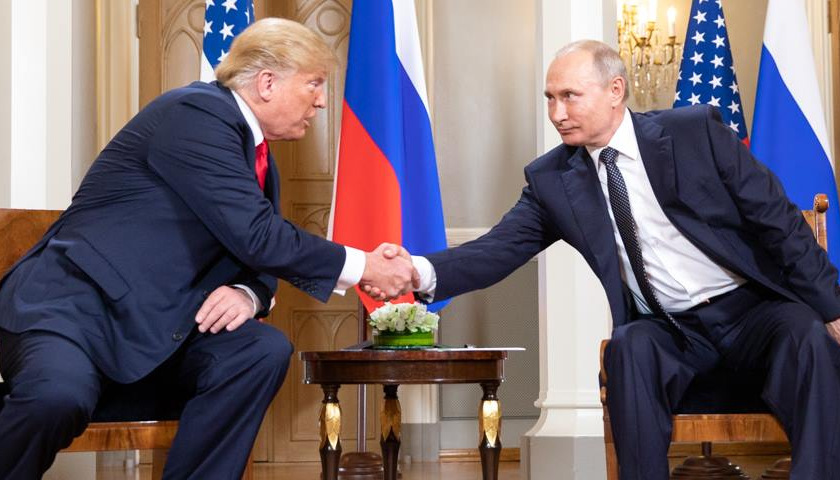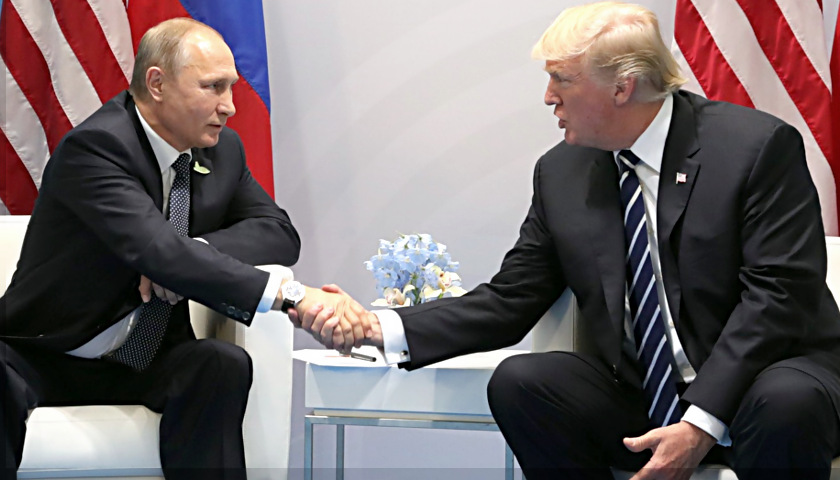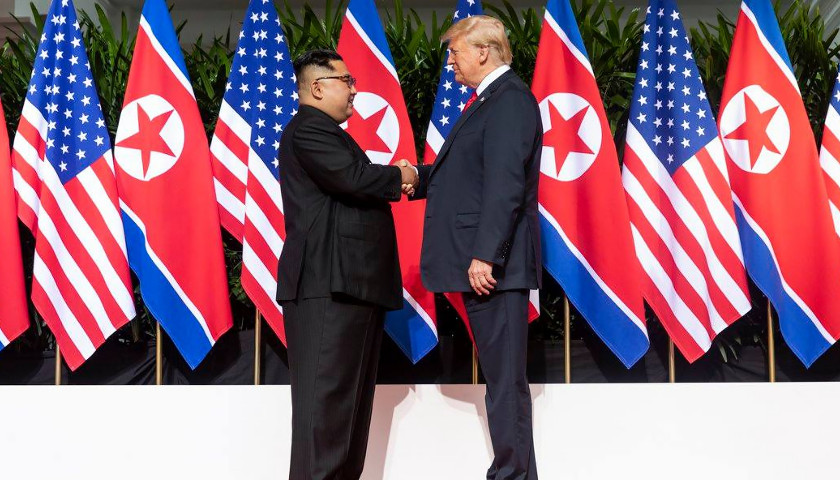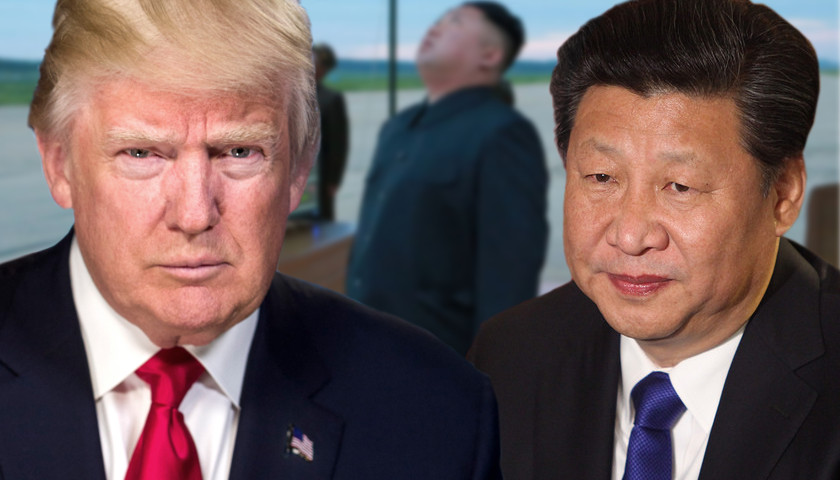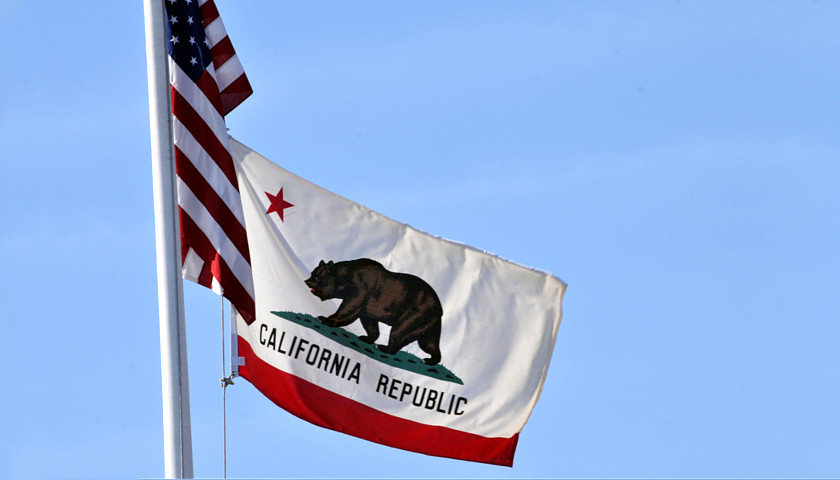North Korean leader Kim Jong Un says he will give the U.S. until the end of the year to make a “courageous decision” on stalled nuclear talks, warning of “very bleak and very dangerous” consequences if Washington does not change its approach. Speaking to a session of North Korea’s rubber-stamp parliament, Kim also said he is open to meeting with U.S. President Donald Trump “one more time,” but only if the U.S. changes its attitude, according to North Korean state media. President Trump responded Saturday morning via Twitter. “I agree with Kim Jong Un of North Korea that our personal relationship remains very good, perhaps the term excellent would be even more accurate, and that a third Summit would be good in that we fully understand where we each stand. North Korea has tremendous potential for extraordinary growth, economic success and riches under the leadership of Chairman Kim. I look forward to the day, which could be soon, when Nuclear Weapons and Sanctions can be removed, and then watching North Korea become one of the most successful nations of the World!” Trump this week said he is considering another meeting with Kim, but insisted the U.S. will not relax sanctions…
Read the full storyTag: United States
Trump Declares US Census ‘Meaningless’ Without Citizenship Question
Reuters President Donald Trump on Monday injected himself into one of the most consequential cases of the current Supreme Court term, saying the nation’s 2020 census would be “meaningless” without adding a citizenship question to the questionnaire. The comment on Twitter came ahead of an expected ruling from the Supreme Court on whether Commerce Secretary Wilbur Ross’ decision to add the citizenship question violated federal law. “Can you believe that the Radical Left Democrats want to do our new and very important Census Report without the all important Citizenship Question,” Trump tweeted. “Report would be meaningless and a waste of the $Billions [ridiculous] that it costs to put together!” Can you believe that the Radical Left Democrats want to do our new and very important Census Report without the all important Citizenship Question. Report would be meaningless and a waste of the $Billions (ridiculous) that it costs to put together! — Donald J. Trump (@realDonaldTrump) April 1, 2019 The citizenship question is among a series of White House policies signaling tighter control over immigration. These include Trump’s declaration in February of a national emergency to obtain funds for a wall on the U.S.-Mexico border, and his threat to close…
Read the full storyCommentary: ‘Exactly When Did You Think America Was Great?’ Says Eric Holder. Here’s the Answer.
by Jarret Stepman There’s no doubt that one of the flashpoints of the modern culture war in America is the debate over our nation’s history. On one side, there are Americans who believe that the United States is a unique country, a shining city upon a hill that while flawed, has been exceptional from the beginning. On the other side is a growing block of Americans who believe America was rotten from its conception, its history worthy of both figuratively and now literally destroying, and that its only hope is in some kind of fundamental transformation to purge it of its past sins and injustices. In simpler terms, it’s a battle of gratitude vs. grievance. Few perhaps represent the grievance side better than former Obama Attorney General Eric Holder, who took the opportunity on Wednesday to scoff at the concept of “Make America Great Again.” “Exactly when did you think America was great?” Holder said on an MSNBC panel in response to supporters of President Donald Trump. “It certainly wasn’t when people were enslaved. It certainly wasn’t when women didn’t have the right to vote. It certainly wasn’t when the LGBT community was denied the rights to which it…
Read the full storyUS Holds ‘Constructive’ Trade Talks With China
American and Chinese trade negotiators made progress during “candid and constructive discussions” in Beijing Friday, said the White House, and will continue talks in Washington next week. The two sides are working to strike a deal to lift eight-month-old tariffs affecting $250 billion of Chinese imports to the U.S., and about $110 billion of American exports to China. The latest round of talks comes amid a report by the Bureau of Economic Analysis that the U.S. trade deficit with China again rose in 2018. “The 2018 goods and services trade deficit with China alone was $379 billion. That’s $70 billion, or 23 percent, higher than in 2016. It’s more than 3 times the size of the 2018 deficit with the entire European Union. China by itself contributed 61 percent of the total US deficit both in 2016 and last year,” according to Derek Scissors, Resident Scholar of American Enterprise Institute. U.S. Treasury Secretary Steven Mnuchin, who is in Beijing, posted on Twitter that the talks will continue next week. .@USTradeRep and I concluded constructive trade talks in Beijing. I look forward to welcoming China’s Vice Premier Liu He to continue these important discussions in Washington next week. #USEmbassyChina pic.twitter.com/ikfcDZ10IL —…
Read the full storyTrump Orders Policy U-Turn on North Korea-Related Sanctions
by Evie Fordham President Donald Trump announced on Twitter Friday he was reversing course on new sanctions on Chinese companies doing business with North Korea. “It was announced today by the U.S. Treasury that additional large scale Sanctions would be added to those already existing Sanctions on North Korea,” Trump wrote. “I have today ordered the withdrawal of those additional Sanctions!” The U.S. Treasury had announced the new sanctions Thursday, not Friday as Trump wrote, and they immediately received “swift pushback” from the governments of both China and North Korea, reported Fox News. “President Trump likes Chairman Kim [Jong Un] and he doesn’t think these sanctions will be necessary,” White House Press Secretary Sarah Sanders said when asked about Trump’s tweet. Trump’s decision came a day after Treasury Sec. Steven Mnuchin detailed the U.S. decision to impose sanctions on two China-based companies. “The United States and our like-minded partners remain committed to achieving the final, fully verified denuclearization of North Korea and believe that the full implementation of North Korea-related UN Security Council resolutions is crucial to a successful outcome,” Mnuchin said in a statement Thursday according to Fox News. “Treasury will continue to enforce our sanctions, and we…
Read the full storyCommentary: Capitalism Saved Sweden
by Michael Munger Josh Billings famously diagnosed a problem with beliefs: “I honestly believe it is better to know nothing than to know what ain’t so.” I am astonished at how many students, and for that matter adults, in the U.S. honestly believe that the U.S. should model itself after Sweden because Sweden has shown that socialism works. I will leave aside the question of whether the U.S. should try to “be like” Sweden; they are very different countries, with different histories and different institutions. But it is important to refute, using simple and widely available empirical evidence, the claim that Sweden is “socialist.” It is not. In fact, Sweden is one of the most robustly capitalist nations on earth. By socialism, I mean a system that relies on state ownership and control of the means of production, state direction of production decisions, and direct state control of education and employment decisions of individuals. If one does not mean those things, then that would require a little more thinking about what “socialism” means. If by “socialism” you mean prosperity and rule of law, then you are confused. There are several important issues to discuss, to understand the differences between…
Read the full storyUS Hits Iran With New Sanctions While Pompeo Visits Lebanon
The Trump administration hit Iran with new sanctions on Friday while Secretary of State Mike Pompeo was denouncing Iran’s growing influence on a visit to Lebanon. The Treasury Department said the sanctions target 31 Iranian scientists, technicians and companies affiliated with Iran’s Organization for Defense Innovation and Research, which had been at the forefront of the country’s former nuclear weapons program. Officials said those targeted continue to work in Iran’s defense sector and form a core of experts who could reconstitute that program. Fourteen people, including the head of the organization, and 17 subsidiary operations are covered by the sanctions. The sanctions freeze any assets that those targeted may have in U.S. jurisdictions and bar Americans from any transactions with them. But, officials say the move will also make those targeted “radioactive internationally” by making people of any nationality who do business with them subject to U.S. penalties under so-called secondary sanctions. U.S. secondary sanctions apply to foreign businesses and individuals and can include fines, loss of presence in the American economy, asset freezes and travel bans. Officials said the threat of such sanctions will significantly limit the ability of those designated to travel outside of Iran, participate in research…
Read the full storyUS Eliminates Coveted 5-year Tourist Visa for Cubans
The U.S. State Department said Friday that it is eliminating a coveted five-year tourist visa for Cubans, dealing a heavy blow to entrepreneurs and Cuban members of divided families, who used the visas to see relatives in the United States and buy precious supplies for their businesses on the island. The elimination of the visa cuts a vital link between the U.S. and Cuba by forcing Cubans to make a costly and complicated trip to a third country like Mexico or Panama every single time they want to visit the U.S. That’s because the U.S. withdrew most of its non-essential diplomatic staff from Havana in September 2017 and stopped issuing visas of almost any type in Cuba. “This affects every Cuban but especially entrepreneurs who have to travel to get products that don’t exist here,” said Niuris Higueras, who brings salt, hand towels, candles and other products from the U.S. for her restaurant Atelier, one of Havana’s most successful private eateries. Change announced on Facebook Until now, Cubans who saved the money and mastered the complexities of successfully applying for a visa in a third country would receive a visa eliminating the need to apply again for another five years.…
Read the full storyMnuchin: Trump-Xi Summit Will Not Happen in March
A summit to seal a trade deal between U.S. President Donald Trump and Chinese President Xi Jinping will not happen at the end of March as previously discussed because more work is needed in U.S.-China negotiations, Treasury Secretary Steven Mnuchin said Thursday. Mnuchin, speaking to reporters following a U.S. Senate Finance Committee hearing, said both sides were “working in good faith” to try to reach a deal “as quickly as possible.” “There’s still a lot of work to do, but we’re very comfortable with where we are,” Mnuchin said. “I don’t think there’s anything significantly different on the currency issue from where we were last time.” Since Trump delayed a threatened March 1 tariff hike on Chinese goods following a late February round of talks, no new face-to-face meetings have been scheduled in the negotiations. But Trump and other administration officials have since sought to portray the talks as still making progress. “We’re doing very well with China talks,” Trump told reporters Thursday at the White House as he sat down to meet Irish Prime Minister Leo Varadkar. “We’re getting what we have to get, and I think we’re getting it relatively quickly.” At another White House event later Thursday,…
Read the full storyFar Left Anti-Electoral College Plan Building Momentum
by CHQ Staff What would you say if we told you Democrats have a plan to change the Constitution without going through the arduous process of amending it according to the process set forth in Article V of our government’s founding document? Well, get ready, because they do, and according to our friend Hans von Spakovsky, senior legal fellow at The Heritage Foundation and a former commissioner on the Federal Election Commission, their anti-Constitutional plan is gaining ground. Democrats have long opposed the Electoral College because with overwhelming margins of victory in high-population states like California they could dominate future presidential elections based on the popular vote, so they have concocted a plan to try to bypass the constitutional amendment process by constructing a multi-state compact to allocate their Electoral votes according to the popular vote. von Spakovsky says the movement going on in all 50 states is sponsored by the National Popular Vote, an advocacy group in California, that claims they can get rid of the Electoral College’s effects by having the states agree to a state compact. “The state compact they are pushing is for state legislatures to agree that in future presidential elections they will not…
Read the full storyCommentary: The Federal Reserve Falls Short of the Rule of Law
by Alexander Salter “Money is power.” We’ve all heard this aphorism many times before. Too often it’s a lazy shorthand dismissal of the finding of mainstream economics, which show that the pursuit and possession of money often entails innocuous or even beneficial consequences for society. Dr. Johnson was right after all: “There are few ways in which a man can be more innocently employed than in getting money.” But there are some contexts in which the saying is apt. An obvious case is the Federal Reserve. The Fed has a monopoly on the creation of base money, the fundamental asset underlying the banking and financial system. And over decades, with each instance of financial turbulence, the Fed has become less constrained in how, when, and why it creates base money. Since the Great Recession, the Fed has been able to bestow purchasing power, liquidity, and solvency on just about any financial organization it pleases. If that isn’t power, there’s no such thing. The Federal Reserve System was created in 1913. It was intended to be a formalization of the interbank clearing system that then existed in the National Banking System. It was not intended to be a central bank.…
Read the full storyUS-China Trade Talks Reach Critical Phase
Deal or no deal? Trade talks between the U.S. and China — the world’s two largest economies — have reached a critical phase. Yet mixed signals coming from the White House and Beijing are causing analysts to question whether President Donald Trump and his Chinese counterpart, President Xi Jinping, will be able to finalize an agreement to end a costly trade war by early April as originally predicted. White House press secretary Sarah Sanders told reporters on Monday that the two sides haven’t set a date yet for a signing summit between Trump and Xi to end the dueling tariffs that are hurting both countries’ economies. In an appearance on Fox News over the weekend, White House economic adviser Larry Kudlow said that negotiations are “making great progress.” However, last week the Chinese side reportedly canceled tentative plans to have Xi travel to President Trump’s Florida retreat, Mar-a-Lago, at the beginning of April for a signing ceremony, causing some analysts to question whether an agreement is truly imminent. Trump has repeatedly touted progress in the talks, but warned that he would pull out of the negotiations if he concluded he wasn’t getting a good enough deal. “He’s going to make…
Read the full storyCommentary: Switzerland’s Foreign Policy Should Be a Model for America
by Brandon J. Weichert As I have written previously, many elites think of the United States as being in a position similar to that of the vulnerable Hapsburg Empire: a large empire possessing indefensible frontiers. But, this comparison flawed. In fact, a more precise analog to the United States is Switzerland. A federal republic like the United States, Switzerland enjoys a natural barrier separating it from the rest of its neighbors in Europe. The United States has two massive oceans, whereas Switzerland has the beautiful Swiss Alps. From behind these natural barriers, the liberty-loving Swiss republic formed, and by European standards, so did a potent market economy. Switzerland hasn’t always been a peaceful state, but it has been able to maintain peaceful relations with all of its neighbors better than most other states. Its beneficial geography has afforded Swiss leaders the time to develop reasonable, low-cost methods for maintaining their country’s sovereignty without becoming too enmeshed in the chaotic world beyond its protective peaks. Switzerland is not an isolationist country, however. Like the United States throughout most of its history, the Swiss simply prefer to rely on diplomacy and trade to handle the bulk of their interactions with most of…
Read the full storySigns Point to China, US Deal to Avert Further Tariff Hike
As China and the United States resume high-level talks in Washington Thursday, there are signs that the two may be closing in on a deal. Reuters news agency is reporting that top trade officials from both sides are trying to hammer out the details of six broad agreements aimed at resolving the most difficult issues from forced technology transfers, to state subsidies and cyber theft. Earlier this week, President Donald Trump said there is no “magical date” for reaching a trade deal, a comment some felt suggests that the March 1 deadline, which could trigger a steep hike in tariffs from both countries, could be postponed if progress is being made. Meanwhile, a senior Communist party adviser, speaking at a forum organized by the Hong Kong-based South China Morning Post, predicted Washington and Beijing would reach a trade deal in early March. He also said that Meng Wanzhou, chief financial officer of Chinese tech giant Huawei, is likely to be released by April or May. Speaking on the sidelines of a conference hosted by the newspaper, Xie Maosong, an adjunct professor at the Central Party School, said he was confident that is what would happen because of what he called…
Read the full storyUS Wants Pledge for Stable Chinese Yuan as Talks Resume
by Reuters The United States is seeking to secure a pledge from China it will not devalue its yuan as part of an agreement intended to end the countries’ trade war, Bloomberg reported on Monday. Officials from the two countries, which resumed talks on Tuesday in Washington, are discussing how to address currency policy in a “Memorandum of Understanding” that would form the basis of a U.S.-China trade deal, the news agency reported, citing unnamed people involved in and briefed on the discussions. U.S. Treasury Secretary Steven Mnuchin had told Reuters last October that currency issues must be part of U.S.-China trade negotiations and that Chinese officials told him that further depreciation of the yuan was not in their interests. The Bloomberg report said the U.S. request for a pledge to keep the yuan’s value stable was aimed at neutralizing any effort by Beijing to devalue its currency to counter American tariffs. Spokesmen for the U.S. Trade Representative’s office, which is leading the talks, and the U.S. Treasury, which leads currency policy, could not immediately be reached for comment. Two days of negotiations between deputy-level officials began on Tuesday, led by Deputy U.S. Trade Representative Jeffrey Gerrish on the…
Read the full storyDespite Current Tariffs, the US Can Expect a Trade Deficit of $410 Billion with China
by Robert Romano Last month, China reported growth of its economy in 2018 at 6.6 percent, the lowest in 28 years. The slowdown is real enough but whether it results in a grand trade deal by the U.S. and China may depend on how much pain China is really feeling at the moment. Is Beijing feeling the pinch? Currently, the U.S. is levying 10 percent tariffs on $200 billion of Chinese goods shipped to the U.S. that came atop a 25 percent tariff on $50 billion of goods from China. While the talks were ongoing, Trump gave China a 90-day reprieve from the 10 percent tariff also rising to 25 percent, which was supposed to happen at the beginning of the year. That’s the U.S. leverage. If the U.S. and China do not reach an agreement, then the tariff will more than double. On the other hand, 2017 set a record for the trade deficit in goods with China at $377 billion according to the Census Bureau. 2018 will be even worse. Excluding November and December data not yet available for 2018, the goods trade deficit from Jan. 2017 to Oct. 2017 was $309.3 billion. For Jan. 2018 to Oct. 2018, it…
Read the full storyCommentary: Contrary to Some Conservatives’ Slavish Devotion Free Trade Dogma, Trade Deficits Do Matter
by Spencer P. Morrison Steve Hanke recently set out to prove “why President Trump’s trade message and protectionist policies are rubbish” in a Forbes article. Instead, the Johns Hopkins University economist exposed himself as a word-mincing, logic-twisting sophist – just like every other intellectual mercenary associated with the faux-libertarian propaganda mill that is the Cato Institute. Hanke’s argument: trade deficits don’t exist, China is not screwing America, and President Trump (the village idiot) is jousting windmills. The real problem is lazy Americans who shop-til-they-drop and demand welfare “gimmies” from Uncle Sam. Faust’s Bargain Hanke begins his argument by explaining that trade deficits don’t really exist. Instead, the goods trade deficit is simply one half of the equation: In economics, identities play an important role. These identities are obtained by equating two different breakdowns of a single aggregate. Identities are interesting, and usually important, by definition. In national income accounting, the following identity can be derived. It is the key to understanding the trade deficit. (Imports – Exports ) ≡ (Investment – Savings) + (Government Spending – Taxes) Given this identity, which must hold, the trade deficit is equal to the excess of private sector investment over savings, plus the excess of government spending over tax revenue.…
Read the full storyPolice Officer Deaths on Duty Increased in 2018, Report Finds
by Neetu Chandak A preliminary report released Thursday found U.S. police officer deaths on duty increased by 12 percent in 2018 from 2017. The National Law Enforcement Officers Memorial Fund, a non-profit dedicated to making police officers’ work safer, found 144 police officers died between Jan. 1 and Dec. 27. Nearly 129 police officers died in the same time frame in 2017. The leading cause of death was gun-related followed by traffic-related incidents. Other forms of death included being struck by a train, having a heart attack and drowning. “The rising number of law enforcement officer deaths in 2018 is disappointing news after a decline in 2017,” the fund’s CEO Craig W. Floyd said in a press statement. “Sadly this reminds us that public safety is a dangerous job and can come at a very steep price.” Texas, Florida, California, and New York had the highest number of officer deaths with 11 each, according to the data. The District of Columbia along with 14 states did not have any police officer fatalities. The number of deaths could change as the numbers are not final, according to the fund. The report comes as an illegal immigrant allegedly shot and killed…
Read the full storyDespite Years of Effort From Activists, Chick-Fil-A Poised to Become Third Largest Fast Food Chain
by Grace Carr Despite ongoing criticism from activists, fast food chain Chick-fil-A is projected to become the third-largest restaurant chain in the U.S., according to an analysis from Kalinowski Equity Research. The fast food chicken chain will rise from its seventh-place spot to rank as the third-largest U.S. restaurant chain by 2018’s close, according to the group’s research, Business Insider reported. “We have long pointed out that Chick-fil-A is the restaurant competitor with which McDonald’s … should most concern itself — and by extension, investors should, too,” analyst Mark Kalinowski wrote in his report. “But this goes beyond McDonald’s,” Kalinowski noted. Kalinowski previously predicted the chain would assume the third-place spot in sales by 2020, but changed his forecast in April to 2019, Business Insider reported. Chick-fil-A’s sales will have risen between 12 and 15 percent by the end of 2018, amounting to an over $1 billion increase in sales, according to Business Insider. Chick-fil-A sales increased by 14.2 percent in 2017, Restaurant Business reported. McDonald’s and Starbucks claim the number one and two spots for restaurant chain sales in the U.S., respectively. Subway ranks third followed by Taco Bell, Burger King and Wendy’s, according to Business Insider. “If this plays out this way, Chick-fil-A’s 2018 U.S.…
Read the full storyEnviros File Lawsuits to Stop Trump’s Approval of Surveys for Oil Deposits
by Chris White Environmental groups are suing to prevent the Trump administration from approving seismic survey testing for oil and gas reserves off the South Carolina coast. Oceana and the Sierra Club argued in legal filings Tuesday that the Commerce Department’s approval of seismic testing violates the Endangered Species Act and the National Environmental Policy Act, among other regulations. “Allowing seismic blasting at this scale in these waters is not consistent with the laws that protect our oceans,” Natural Resources Defense Council Director Michael Jasny noted in a press statement shortly after the lawsuits were announced. Such leases could lead to exploratory drilling for the first time in several years. Acoustic tests involve boats tugging rods pressurized for sound and emitting jet engine-like booms seconds apart for days. The exercise effectively uses reflected seismic waves to measure the Earth’s subsurface, but the technique also poses risks to marine life sensitive to sound waves. Oil producers are supportive of the approval process. The American Petroleum Institute released a Nov. 15 report that shows tapping oil and natural gas reserves in federal waters could be worth $1.5 billion in tax revenue to South Carolina over two decades. Tax revenue from the…
Read the full storyChina Faces U.S. Pressure to Contain Deadly Fentanyl Exports
by Joyce Huang After meeting with Chinese President Xi Jinping at the G-20 meeting earlier this month, U.S. President Donald Trump praised China for considering imposing the death penalty on illicit producers of fentanyl – an opioid up to 100 times more potent than morphine with a lethal dose of just two milligrams in most people. When fentanyl, which is used as a pain medication but has a high potential for abuse, was highlighted during a meeting between the leaders of the United States and China in Buenos Aires earlier this month, some analysts in China saw it as another one of Washington’s tactics to embarrass China. Others, however, note that reaching out to China to contain its deadliest export to the United States may not be enough if the country doesn’t ease its dependence on painkillers. Game changer Xi has promised to criminalize the sale of deadly fentanyl to the United States, according to Trump, who said it has the possibility of being “a game changer” in easing the fentanyl overdose epidemic in the United States. “Last year over 77,000 people died from Fentanyl in the US. If China cracks down on this ‘horror drug,’ using the Death…
Read the full storyTicket Prices Plummet for Bill and Hillary Clinton Tour
by Joe Simonson Ticket prices for the Clintons’ world tour have bottomed out, with prices as low as $11 at some locations. Both Bill and Hillary Clinton have been trekking across the United States and Canada over the past few months and have dates set through May 2019. Audience members can pay to hear the power couple opine on current events and reflect on their legacy in American politics. The New York Times’ Maureen Dowd paid $177 for her ticket, yet prices for future events have plummeted. [ RELATED: Should Hillary Run In 2020? ] Seeing the duo at the Financial Centre in Sugar Land, Texas, on Dec. 4 runs anywhere from $11 to $80 depending on the seat quality. On resale sites, some sellers are asking for as much as $531 a ticket — although it’s unclear if they’ll be able to find a buyer at that price. In contrast, former first lady Michelle Obama is on her own speaking and book tour. Tickets for that event range anywhere from $300 to $2,500. – – – Joe Simonson is a reporter for the Daily Caller News Foundation. Follow Joe on Twitter. …
Read the full storyUS Abortions Hit Lowest Number Ever Since Roe V. Wade
by Grace Carr The United States saw the lowest number of abortions ever reported between 2014 and 2015 since 1973’s Roe V. Wade legalized abortion, according to a Wednesday report. Between 2014 and 2015, the total number of reported abortions decreased two percent, falling to a rate of 11.8 abortions per 1,000 women aged 15 to 44 years, according to a Wednesday Centers for Disease Control and Prevention surveillance report. A total of 638,169 abortions were reported in that year, according to the CDC. The report contains the most recent nationally representative data on abortion in the U.S. Between 2006 and 2015, the total number of reported abortions also decreased 24 percent, according to the report. Between 2006 and 2010, the number of reported abortions decreased by 19,280 per year. The number of reported abortions also fell between 2011 and 2015, decreasing by 23,087 per year, according to Wednesday’s report. White and black women accounted for the largest percentages of all abortions between 2014 and 2015, according to the report. Just over 14 percent of all women who obtained abortions in that year were married, while 85.7 percent were unmarried, according to the report. California, Maryland, and New Hampshire do not publicly report…
Read the full storyCommentary: To All the Disillusioned Bredesen Supporters, Illinois Awaits
by Marshall Towe One of the enduring beauties of America is our freedom of movement. Citizens easily migrate between States, unregulated, for things such as schooling, employment, retirement or just better weather. After reading the November 8th, 2018 article in The Tennessee Star by Chris Butler chronicling many Bredesen supporters taking to social media with threats of leaving Tennessee, there is a clear message to be conveyed: Illinois wants you! For years now, hundreds of people per day immigrate to Tennessee, one of the fastest growing States, while Chicago, in Cook County, in the State of Illinois have topped the list of most population lost in each the these category for years. For those Bredesen supporters upset with the election result and the direction of Tennessee, nothing can beat a debt-ridden Illinois, where its $225 billion debt is tops in the country, with the added benefit of a bond rating one notch above junk. Tennessee, with its constitutionally mandated balanced budget and State Government with the fiscal responsibility to manage its budget to an annual surplus while accumulating a rainy day fund, is not for you. It is a guarantee that Chicago will welcome and embrace you with open arms,…
Read the full storyThe Top Ten Most Epic Presidential Vetoes in American History
by Lawrence W. Reed President James Garfield named his beloved dog Veto. The pooch was a monstrous but lovable black Newfoundland weighing more than a hundred pounds. Congress got the message: A bad or unconstitutional bill would go straight to the Garfield doghouse. (Sadly, none ever did because Garfield served only five months in office.) The veto itself is a long-established and venerable tool of republican government in numerous countries. Along with term limits, separation of powers, habeas corpus, and more, it counts among the storied contributions the ancient Roman Republic gave the world 25 centuries ago. The term itself comes from Latin and means “I forbid!” So committed were the early Romans to hamstringing the ambitions of power-seekers that they licensed the tribunes of popularly-elected assemblies to kill a bill from the Senate, and they invested each of the two highest officials in the government (the consuls) with the authority to nix the decisions of the other. The veto helped to constrain activist legislators and preserve the Republic for nearly 500 years. Inspired by the Romans, America’s Founders baked the power of presidential veto into the Constitution right from its inception—in Article I, Section 7. The President may block…
Read the full storyCommentary: Trump Asks ‘Why Can’t We Be Friends?’ and Critics Won’t Stop Ripping Him
by Jeffery Rendall Why can’t we be friends, Why can’t we be friends, Why can’t we be friends, Why can’t we be friends?… I’d kinda’ like to be the president So I could show you how your money’s spent… ~ War, 1975 This classic War (the musical group) song came to mind after enduring the barrage of establishment media (and #NeverTrump’s) insults after last week’s summit between Presidents Donald Trump and Vladimir Putin. It’s evident from the over-the-top reactions of some in the political chattering class that being “friends” with Russia is not possible – or even desirable. The whiners and complainers acted as though Trump gave away the keys to the American military’s lockbox and set the tone for a surrender to the diminutive Putin and his pseudo-commie lackeys. Hardly; Trump was merely advancing the widely held and accepted notion that peace is a good thing. It’s hard to fathom how advocating for perpetuating and furthering tensions with a major nuclear power would be beneficial to the average American, yet if some of these media people had their way U.S. forces would be on the doorstep of the Kremlin hoping to get a clean shot at the Russian brain trust.…
Read the full storyChina’s Unconventional Multi-Front War on the United States
by Printus LeBlanc China has a strategy unlike any the U.S. has faced. In the Cold War with the Soviet Union, it was military force versus military force. China learned a lesson from the USSR and is taking an asymmetrical approach in dealing with the U.S. Yes, China is challenging the U.S. in the military sphere, but it is also attacking the U.S. on multiple unexpected fronts. China is attacking the U.S. in ways Russia was never capable of, and has proven to be far more dangerous. When the U.S. thinks of warfare, it typically thinks of kinetic warfare, physical destruction of a target by military means. China, however, has adopted a total warfare strategy. A 2014 White Paper from U.S. Army Special Operations Command on Unconventional Warfare discusses different methods of warfare being used by various adversaries. With regards to China, it stated, “China will use a host of methods, many of which lie out of the realm of conventional warfare. These methods include trade warfare, financial warfare, ecological warfare, psychological warfare, smuggling warfare, media warfare, drug warfare, network warfare, technological warfare, fabrication warfare, resources warfare, economic aid warfare, cultural warfare, and international law warfare.” An example of China using…
Read the full storyTrump-Putin Summit Shows Why the President Is Ahead of the Curve
By Robert Romano President Donald Trump will be meeting Russian President Vladimir Putin in Helsinki, Finland on July 16. There the two will discuss nuclear weapons and U.S.-Russian relations. This is not only the right time to cool tensions between the two foremost nuclear powers — who have clashed over Syria, Ukraine and other potential hotspots — but also the right time politically for Trump to take to the international stage. Coming off a successful summit in Singapore with North Korean leader Kim Jong-un, achieving an agreement in principle to denuclearize the Korean peninsula, President Trump’s popularity is soaring. He has the political capital to meet with Putin. Trump’s surge, simultaneously stunning and perplexing to D.C. elites — but not to his supporters — comes as he does not appear to be hampered even in the slightest by the ongoing Russia investigation by Special Counsel Robert Mueller. Probably because there was no collusion. But not only does Trump have the political capital to meet with Putin from a position of strength, it is politically smart for him to do it. Peace is popular. Not only is this what Trump ran on in 2016 — achieving a better relationship with American adversaries…
Read the full storyPresident Donald Trump Meets Kim Jong Un in Singapore for Historic Summit
by Steve Herman President Donald Trump and North Korean leader Kim Jong Un have moved on to a working lunch of beef short ribs, sweet and sour crispy pork, and braised codfish. Among those joining the leaders on the U.S. side were Secretary of State Mike Pompeo, White House chief of staff John Kelly and national security adviser John Bolton. The North Korean delegation included Kim Yong Chol, a top aide to Kim Jong Un who recently met Trump at the White House. Early,Trump said a one-on-one meeting withKim was “very, very good,” and he spoke of having an “excellent relationship” as they held talks Tuesday in Singapore about the possible denuclearization of the Korean Peninsula. After about 40 minutes alone, except for interpreters, Trump and Kim each brought a small delegation of officials for more extensive talks. The U.S. side included Secretary of State Mike Pompeo, National Security Adviser John Bolton and White House Chief of Staff John Kelly. “We will solve a big problem,” Trump said ahead of the main talks. Tuesday’s unprecedented first meeting of a sitting U.S. president and a North Korean leader began with Trump and Kim coming together in front of a background…
Read the full storyChina Watching Kim-Trump Summit Closely
China may not be participating directly in the summit between U.S. President Donald Trump and North Korean leader Kim Jong Un, but in some ways Beijing will be the invisible third party in the room. Like many countries in the region, China will be watching the Trump-Kim summit closely for signs of the possible impact the meeting could have on its interests. During the roller coaster run-up to the sit down, China has played a significant role. Analysts note Beijing’s participation in expansive international sanctions was a key factor in getting Kim to the negotiating table. Even though, Beijing has tapered off its enforcement in recent months. “China was participating in an unprecedented sanctions regime, very close to embargo, without Chinese participation it would be much less likely that North Korea’s government would’ve agreed to talk,” said Andrei Lankov, director of the Korea Risk Group, a provider of risk analysis, news and information on North Korea. Before Tuesday’s meeting, Xi Jinping met twice with Kim Jong Un. On Monday, China’s Foreign Ministry confirmed that Kim flew to Singapore on an Air China passenger jet. It did not clarify whether Beijing footed the bill, but that it provided the plane at…
Read the full storyStudy: California Has Worst ‘Quality of Life’ in U.S.
California has the worst quality of life in the United States, according to a new ranking released Tuesday by U.S. News & World Report. According to the study, California ranked No. 32 overall but came in 50th place for quality of life, just after New Jersey in 49th and Indiana in 48th.
Read the full story
